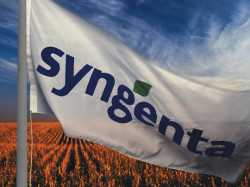Brazilian Soybeans, U.S. Selective Herbicide Demand Drive Syngenta Sales

Syngenta said its quarterly sales rose 8% and 11% at constant currency rates, citing a strong start to the season in Brazilian soybeans and pre-season demand for selective herbicides in North America, where concerns about glyphosate-resistant weed are weighing more heavily.
“The main driver was Brazil, where the soybean seed portfolio outperformed in a strong market: a robust commodity price and the depreciation of the real are boosting grower profitability and are expected to result in record soybean plantings,” the company said in a statement.
Commenting on the company’s outlook, CEO Mike Mack said: “During the quarter it has become clear that U.S. corn seed production yields are significantly ahead of expectations. We will recognize this in 2013 by writing down the value of seeds in excess of estimated sales for the coming season. Full-year earnings will also reflect a lower-than-expected currency benefit. Final results will depend on the progress of the Latin American season but at this stage earnings per share are expected to be close to last year’s underlying level.
“Looking further ahead, we remain on track to deliver our target of $25 billion in sales of our eight key crops in 2020. We expect improved profitability in 2014 and maintain our target of an EBITDA margin in the range of 22% to 24% in 2015.”
During the third quarter, Syngenta posted double-digit growth inAsia Pacific emerging markets, reflecting ongoing adoption of fungicides and modern insecticide chemistry. Performance was particularly strong in South Asia, where good monsoon conditions bolstered demand, the company said.
Sales in Italy rose sharply as the market improved, and the emerging markets in Southeast Europe, particularly Turkey, continued to expand rapidly, Syngenta said.
In North America, wet conditions in parts of the United States contributed to reduced insect pressure but created new opportunities for fungicides. The company saw strong growth in its Callisto brand selective herbicide for corn and Flex for soybeans. In non-selective herbicides, its Touchdown product sales grew rapidly in Brazil, as supply shortages from competitors drove volume and price gains, it said. Fungicide sales also continued to climb: Amistar sales more than doubled in the United States and grew strongly in Asia Pacific, according to Syngenta.
In seeds, Syngenta said corn and soybeans accelerated with a significant contribution from soybeans in Brazil. Growth in diverse field cropswas modest after a strong first half and came mainly from oilseed rape in Europe. Vegetables growth was concentrated in the United States and Brazil.





